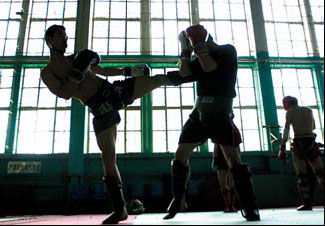
A recent report by China Central Television indicates there are about 100 million people worldwide practicing Chinese taichi, arguably the most popular and best-known Chinese wushu style today.
In provinces where wushu is part of the local tradition, such as Shandong and Henan provinces, the number of wushu enthusiasts run into the millions, says Li Xianwei, deputy head of Shandong Laizhou Wushu Training Center, a privately owned wushu school.
At present, China has reportedly over 15,000 registered wushu schools, besides the numerous private coaching centers.
The number was much larger back in the 1980s when kungfu movies and TV drama series such as Shaolin Temple starring Jet Li and Drunken Kungfu Master starring Jackie Chan were popular among young people, fueling a strong interest in ancient Chinese martial arts, says Li whose training center has at least 1,000 students aged between 5 and 18.
Since its establishment in July 1992, his center has trained over 12,000 students, including some from other countries and regions.
Over the past few years, the center has opened 10 branches in countries such as France, Spain, South Africa, and the United States, providing all kinds of traditional wushu courses for foreigners.
For a better and quicker grasp of Chinese kungfu, some foreigners have come to China, seeking apprenticeships under kungfu masters.
Among the most sought-after destinations are the "hometown of Chen- Style Taichi" - Chenjiagou, in Wenxian county and Tagou in Dengfeng county where Shaolin wushu courses are available to foreigners.
Websites and on-line communities about kungfu have increased dramatically in recent years.
"Websites such as YouTube have plenty of Chinese kungfu-related materials," says Tim Grose, an American student who has converted from a veteran karate practitioner to a Chinese kungfu learner.
"It seems that Chinese wushu is drawing increasing attention," says Lumbroso Florent, a 23-years-old French student, learning wushu and Chinese at the Beijing Chemical University.
"Chinese wushu is more culture and philosophy than fists, kicks, elbows and shouts," he says.
"Peace, inner peace, is at the core of wushu and that's why I am fascinated with it," he adds.
Indeed, wushu is gaining a high profile among the general public, especially with the upcoming Beijing 2008 wushu tournament, says Zou Guojun, CEO of Shenghua International Martial Club, an influential professional organization that specializes in training and teaching martial arts, taekwondo and kickboxing in China.
The tournament is scheduled to open from Aug 21-24 on the sidelines of the Beijing Olympic Games.
Also, in October, Harbin will play host to the National Kungfu Challenge.
"Although wushu is not among the 28 sports to be held during the Beijing Olympic Games, it will definitely become popular among visitors to the Games," says Zou.
But concerns over the future of the traditional martial art remain. Some worry that a growing number of young people are being drawn to such foreign sports and martial arts styles as taekwondo, judo, karate and muay Thai.
"These imported martial arts styles are attractive to some young Chinese fond of trendy, popular culture introduced to Chinese people through movies, songs, dance and lifestyle," says Ding Xin, a post-graduate student with Peking University.
But for Ding, it is time to embrace Chinese wushu.
"With China's growing international influence, we have an increasingly stronger feeling for our own culture," Ding says.
(China Daily May 7, 2008)